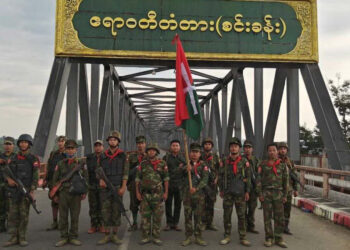RANGOON — Preliminary data released on Monday by an Asian research institution offer a window into the mindset of Burma’s little-understood electorate just over two weeks ahead of the start of the Nov. 8 election’s official campaign season.
Much of the data confirm opinions that were long-assumed to be held among Burma’s population of more than 51 million: A majority support democracy, greater autonomy for ethnic minorities and strengthening federalism, while distrust in the nation’s judiciary and police force runs high; most people see land-grabbing as a serious issue, while “the economy” was viewed by 45 percent of respondents as the most serious problem facing the country; and a significant majority identify deeply with religion.
Researchers deployed by the Taiwan-based Asian Barometer Survey polled 1,620 respondents across all 14 of Burma’s states and divisions, taking a representative sample of the country at large and asking more than 200 questions on political, economic and social views.
The survey results are not without surprises. Respondents were almost evenly split on whether the military should retain a role in politics, with 39 percent in favor and 40 percent against.
A majority of respondents (57 percent) declined to respond when asked whether they supported constitutional amendments to two of the charter’s most contentious provisions, articles 59(f) and 436. Article 59(f) bars popular opposition leader Aung San Suu Kyi from presidential eligibility, while Article 436 requires a vote of more than 75 percent to change the Constitution, granting the military an effective veto power.
The survey recorded notable differences on some questions between ethnic minority respondents and those from the country’s majority-Bamar population, including in opinions on empowering regional legislatures to select their state or divisional chief minister.
A total of 64 percent of respondents supported the change from the current system of presidential appointment, but with 77 percent of ethnic minority respondents indicating that they favored the amendment, versus 60 percent of the country’s ethnic Bamar majority.
An effort to change the constitutional provision on chief ministers, backed vocally by ethnic minority lawmakers, failed to clear the 75 percent hurdle when it was put to a vote in Parliament in June.
As expected, Suu Kyi’s National League for Democracy (NLD) was viewed as the party most likely to win respondents’ future vote, though the numbers would appear to indicate a less dominant standing than the results of Burma’s 2012 by-election would suggest. While noting that half of all respondents declined to express a party preference, 24 percent nationwide said they would vote NLD, compared with 16 percent who said they would choose the ruling Union Solidarity and Development Party (USDP).
The NLD secured a landslide victory in Burma’s April 2012 by-election, winning 43 of the 44 seats it contested.
The survey gives reason for hope among the country’s ethnic minority political parties, documenting notable differences in party preference in ethnic minority regions, where only 17 percent said they would vote NLD, compared with 25 percent who chose “other party.”
Interestingly, the findings indicate that 62 percent of the electorate nationwide feels no party affiliation at all, upping the stakes for a fast-approaching campaign season starting Sept. 8, when parliamentary aspirants from more than 90 political parties will vie for voters’ favor.
The survey offered a degree of statistical verification for a long-presumed desire to see opposition leader Suu Kyi as president: Asked to state their preferred president, 26 percent nationwide said Suu Kyi, compared with 16 percent who supported incumbent Thein Sein, though again those declining to answer (54 percent) leave plenty of room for interpretation.
Asked the related question on removing Article 59(f), 36 percent spoke in favor, with 7 percent against and 57 percent declining to answer.
Despite their preference for Suu Kyi, 80 percent of respondents said they were “very” or “somewhat” satisfied with Thein Sein’s performance.
Looking ahead to the Nov. 8 vote, one-third of respondents felt the 2015 poll would be “completely free and fair,” while only 4 percent thought the opposite, with one-third declining to answer the question.
While the survey broadly found reason for the NLD and other opposition parties to be optimistic about their electoral prospects, the ruling USDP may take comfort in some of its findings.
The military and the president, both of which are closely affiliated with the USDP, were viewed as two of the country’s most trusted institutions. Parliament, also stacked with USDP members, earned “a great deal” or “quite a lot” of trust from 43 percent of respondents in total.
Asked whether economic development or democracy was more important, 53 percent said the former, compared with 30 percent who preferred the latter. Unlike the NLD, the ruling USDP can take credit for economic growth and a surge in foreign investment since the lifting of Western sanctions during its term of office.
Unsurprisingly, only 5 percent of respondents said Burma had achieved “full democracy,” with fully 73 percent saying democracy in Burma had minor or major problems, or was not a democracy at all.
The wide-ranging survey will offer analytic fodder for Burma researchers across socioeconomic fields of study, but with less than three months until the historic general election, it is the politically weighty data that are likely to attract the most attention in the near term.
The survey adds to a small but growing body of research into public attitudes in a country where reliable statistics are in short supply. Indicative of the dearth of information, it was not until the release of 2014 census data that Burma’s long-cited population figure of 60 million was debunked, when it was revealed that just over 51.5 million people were residing in the country.
Asian Barometer Survey worked with the Yangon School of Political Science to conduct the survey from January to March 2015. Its full results are due to be released later this year.

















